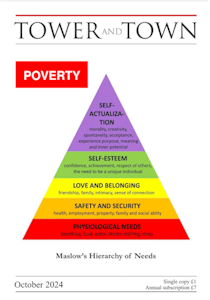

Tower and Town, October 2024 (view the full edition) (view the full edition)Hunger 4 KnowledgeFor primary-age children, a nutritious hot meal at school can play a vital role in their overall well-being and academic success. When children do not receive a hot meal during the school day, the consequences can be significant, affecting their physical health, cognitive development, and emotional well-being. One of the most immediate impacts is on a child's ability to focus and learn. Hunger makes it difficult for children to concentrate, participate, and retain information. Without proper nutrition, children may become easily fatigued or distracted, resulting in poorer academic performance. Studies have shown that well-nourished children tend to perform better in school, while those who skip meals or eat insufficiently are at risk of falling behind. In addition to academic challenges, not receiving a hot meal can negatively affect a child's physical health. School meals often provide essential nutrients that may be lacking at home, particularly in low-income families where access to balanced meals is limited. A lack of proper nutrition can lead to issues like stunted growth, weakened immune systems, and a higher likelihood of developing chronic illnesses such as anaemia or diabetes. Emotionally, hunger can lead to irritability, anxiety, and behavioural issues. Children who come to school hungry may struggle with self-regulation and social interactions, leading to conflicts with peers and teachers. Over time, this can contribute to lower self-esteem and social isolation. Providing hot meals at school helps ensure that all children, regardless of their home situation, receive at least one balanced, nutritious meal each day, promoting their health, academic success, and emotional development. Kym-Marie Cleasby |